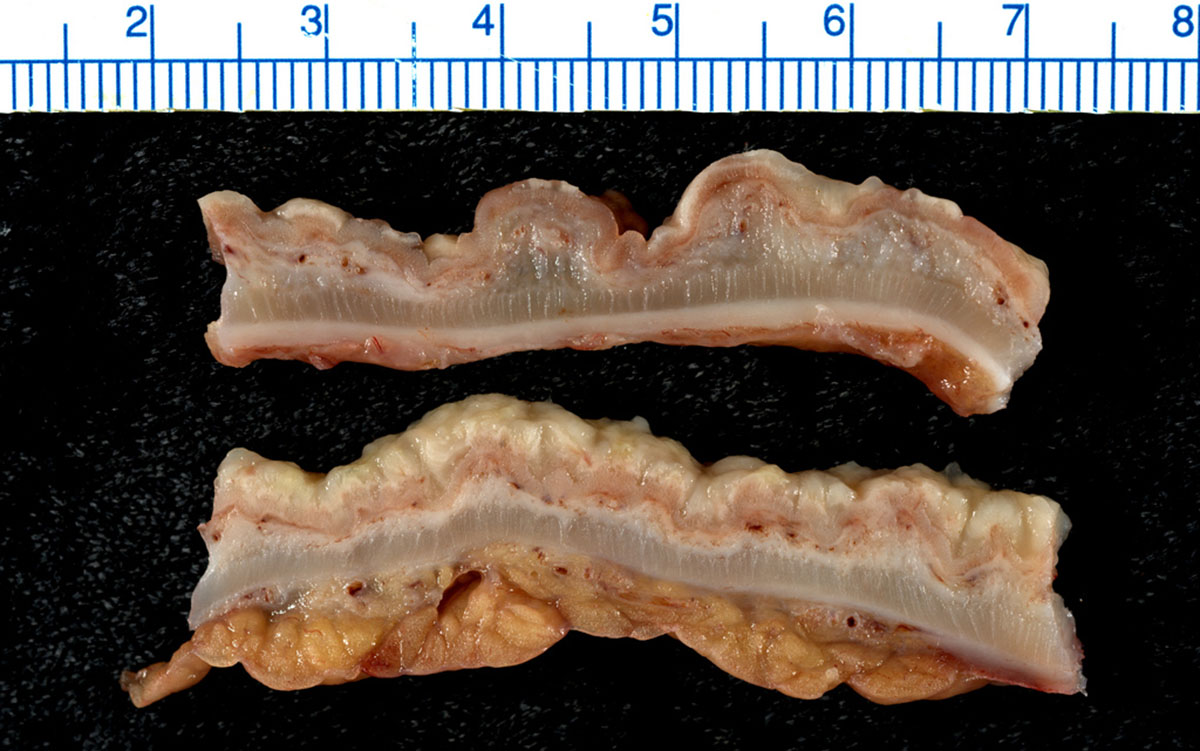Table of Contents
As important as it is to ease the discomfort of inflammatory bowel disease, mucosal healing is even more important over the long run. When ulcers in the lining of the digestive tract, there will be:
- Lower risk of developing a fistula, a second opening of the bowel through the skin.
- Lower need for steroid anti-inflammatory medications, which can cause osteoporosis, weakened immunity, weight gain, and psychiatric issues.
- Fewer relapses of pouchitis, diarrhea, and abdominal pain.
- Reduced risk of needing a colectomy.

Experts generally define healing as one year (or 50 weeks) without serious symptoms. It is not necessary to be absolutely ulcer-free to be declared in remission from inflammatory bowel disease; but there should be no disabling symptoms for 50 weeks or more. Unfortunately, part of making sure of mucosal healing is increased use of colonoscopy to monitor progress. On the whole, however, colonoscopy is less unpleasant than the day to day symptoms of the active disease.
Which treatments are most likely to induce a long-term state of mucosal healing? There is general agreement that steroids do not induce healing. They only relieve pain and inflammation in the short term. Also, different sets of treatments may be needed for Crohn disease and ulcerative colitis.
In Crohn disease, mucosal healing may be achieved by:
- Steroid drugs, or
- Adalimumab (Humira), or
- Infliximab (Remicade).
The medication Mesalamine may relieve symptoms in a small number of people who have Crohn disease, but it will not bring about mucosal healing. Remicade is more likely than Humira to sustain mucosal healing.
In ulcerative colitis, mucosal healing is much easier in mild to moderate disease than in severe, active disease:
- Daily administration of an extended-release form of Mesalamine (Apriso, Asacol, Canasa, Lialda, Pentasa, or Rowasa), if the condition is mild to moderate. Generally, higher doses are more effective than lower doses. As many as 80 percent of users achieve mucosal healing in just six weeks.
- In ulcerative colitis patients who are dependent on steroid medications, azothioprine (AZA) may lead to mucosal healing and discontinuation of the steroids. However, AZA, like steroids, weakens the immune system.
- Moderate to severe ulcerative colitis may be brought into remission about 25 percent of the time by a year's administration of adalimumab (Humira).
- Up to 87 percent of patients have achieved remission during a 12-week clinical trial with tacrolimus (Hecoria), although sudden hair loss was a possible side effect.
READ Helicobacter pylori: The Bacteria that Cause Ulcers
Different medications are required in ulcerative colitis:
- In one study, no patients on continuous adulimumab (Humira) treatment for a year achieved mucosal healing.
- In another study, 43 percent of patients who received both inflixumab (Remicade) and azothioprine (AZA) achieved mucosal healing in 26 weeks. Continuing treatment with inflixumab sustained mucosal healing once it was achieved.
There are a number of reasons people who have inflammatory bowel disease are well served to strive for mucosal healing. There is lower risk of formation of fistula, a second opening of the bowel through the skin. There is lower risk of colorectal cancer. There is lower risk of megacolon, which may necessitate removal of the colon. Achieving stability with inflammatory bowel disease seems to require taking an expensive monoclonal antibody, but there are programs to help with the cost of the drug and there are ways to manage the immune suppression caused by the disease. Don't settle just for treatment of symptoms. Seek long-term solutions that maximize quality of life.
- Dave M, Loftus EV Jr. Mucosal healing in inflammatory bowel disease-a true paradigm of success? Gastroenterol Hepatol (N Y). 2012 Jan. 8(1):29-38.
- Van Assche G, Vermeire S, Rutgeerts P. Treatment of severe steroid refractory ulcerative colitis. World J Gastroenterol. 2008 Sep 28. 14(36):5508-11.
- Photo courtesy of nauright: www.flickr.com/photos/nauright/4268378538/
- Photo courtesy of euthman: www.flickr.com/photos/euthman/7410584706/

